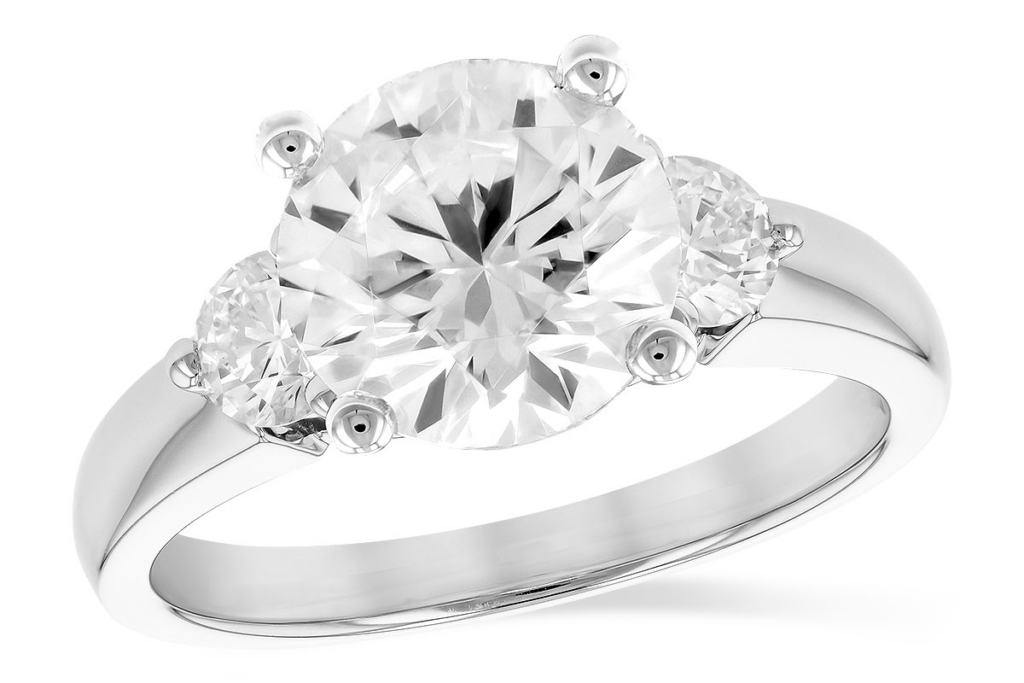One of the decisions to make when it comes to buying engagement or wedding rings is the type of metal to use. Each metal listed below has unique properties and characteristics which you need to consider.
Depending on one’s lifestyle, preference, habits, and skin undertone, some metals may be best suited to the person wearing them than the other. Therefore choosing the best metal for your rings is one of the more important decisions to make.
In this article, we will discuss the most common/traditional metals used for wedding bands and engagement rings.
Gold
This is the most common metal to use in rings, or any jewelry for that matter. Gold is highly malleable and versatile, does not corrode, nor tarnish, (one of the least chemically reactive (“noblest”), and is attractive to look at.
Gold in its purest form is soft and is not suitable for jewelry. In fact, pure gold is at 2.5 on the Mohs scale of hardness. this is why gold is combined with other alloys to make it strong.
Gold is measured in Karats and expressed in 24ths, each karat is 1/24. The purest form is 24K (24/24) gold (99.9%). To achieve pure 24-karat gold jewelry, it is combined with 1% titanium as titanium is known to be durable.
Other Karats available are 18K is 75% gold and 25% allow, 14K is 68% gold and 42% alloy, 12K is around 50% gold and 50% other alloys, and 10K is 42% gold and 58% alloy.
There are several colors of gold, depending on the alloys mixed. The most common are:
White gold
Since gold is naturally yellow in nature, white gold is alloyed (mixed) with nickel, silver, zinc, or other white metals to make it white. Alloyed Gold is also usually plated with rhodium to achieve that bright white shine.
The only issue with rhodium-plated gold is that it wears off. When it does, white gold will become yellowish – showing the true color of gold. This can be re-polished or replated so that it can turn back to white gold.
The white shade ranges from yellow to white depending on the proportion of white metals added to it.
Yellow Gold
As mentioned, gold in its purest form is soft and is not ideal for jewelry making. Thus, gold is mixed with other alloys such as silver, copper and a little zinc to produce various shades of yellow. Yellow gold is the usual choice for traditional bands.
Rose Gold
The beautiful and feminine color of rose gold is achieved by combining yellow and copper. The shade depends on the ratio of copper and over time, may appear darker or redder or more vintage because of the copper component.
Is Gold the best metal for you?
Price-wise, gold is cheaper than platinum, but gold holds its value and is a highly liquid metal (can be easily turned into cash). On its own, it does not react with many chemicals and will not rust or tarnish. Just be aware of the other alloys that are combined with gold to check if you have any allergic reactions.
BUY IF: You want to go for a more traditional band, and would want something that will hold its value. It is also malleable and easy to resize. Just be sure to take extra care as gold will likely bend, scratch or dull with everyday use.
Silver
Next to gold, this is one of the most popular metals to use for pieces of jewelry. And also like gold, the purer the silver, the softer it is. Most silver jewelry pieces are 92.5% silver. The remaining 7.5% is a combination of copper or nickel.
99.9% silver or pure silver is more resistant to tarnish. The downside is that Pure silver is not as bright or shiny as 92.5%. 92.5% is harder than pure but is relatively softer than other metals.
Is Silver the best metal for you?
Sterling silver is prone to scratches and dents, and will also tarnish and oxidize. You can sell silver, but beware as they are cheaper than gold or platinum.
BUY IF: looking for white metal that is affordable. Beware that this ring will oxidize and will scratch easily. If not taken care of properly, silver jewelry will dull.
Platinum
Platinum is one of the noble metals, which means that it is hypoallergenic and does not react to chemicals that usually cause corrosion or rust. This makes platinum suitable for persons with a more active lifestyle.
Platinum for jewelry is often mixed with other metals and alloys to make it more workable. The most common purity levels are between 85% to 95%
While platinum is harder than gold, a 14k gold will be harder than a platinum. And in this case, will most probably dull.
Because of these properties, platinum is on a higher price point that gold.
Is Platinum the best metal for you?
Platinum is harder than gold and silver, but is softer than Titanium, thus may acquire scratches over time. While Platinum is hard, it is much easier to resize and decorate with intricate details. It will not react to any bodily chemical which is good for athletes or those with active lifestyles, but not good for those whose jobs requires more handwork.
BUY IF: You want to have a stronger metal than silver and is more resistant to scratches and dents.
Which one is it?
These are the 3 most common metals available in the market. Out of the three, Gold is the most common because of its price point and quality. Silver is the last choice among the three because of the chemical reaction silver has over time.
On our next post, we will discuss the metals that are either unique, or is becoming the trend for new wedding rings and engagement buyers.








